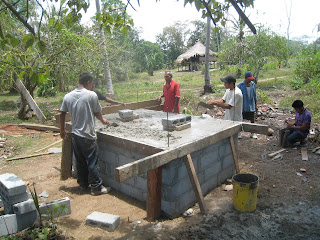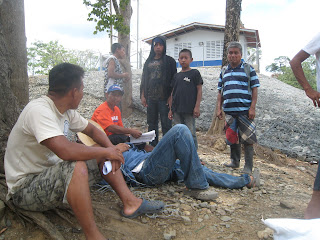A former Peace Corps Volunteer has boldy returned to the
Darién to work as a missionary with a church in Yaviza. He is passionate about EH work and has
the funds to execute some projects.
Alan approached me about building some composting latrines throughout
the Comarca Emberá-Wounaan.
Similar to what I want to do, he is promoting starting with pilot
latrines.
He asked me to go to the community of Sinai, a Wounaan
community, which is about 3.5 hours up river from Alto Playón. I had been to Sinai with IOM and given
talks about composting latrines, and I told Alan I would be happy to go. He mentioned that he also had the funds
to pay a ‘tecnico,’ someone to lead the build. I mentioned that my Health Committee President Atilio is a
great construction worker, and passionate about composting latrines. Alan and I both saw the value of
someone from the Comarca going to a neighboring community and leading the
build. Atilio was hired for
$20/day.
As we were waiting for transport at the port, Atilio was
chatting with some people who were asking him where he was going. He told them he was going to Sinai to
build composting latrines, and they were intrigued. Within a second Atilio starts explaining to fellow Emberá
folks in his language, what composting latrines are, how to maintain them, and
why they are important to one’s health
and lifestyle. It was great
because he started speaking with 2 people, and as he got more passionate and
showing them pictures, he suddenly had 10 people crowded around him. I had to sit back and revel in the
moment, and even pat myself on the back.
The build went great.
The community members were motivated to work. I do believe more capacity building is needed however. Some of the beneficiaries weren’t sure
how to use the latrines. Atilio
was able to explain to them how to maintain the latrine, and the composting
process.
 Wounaan culture is very similar to Emberá culture, however
the language is very different.
One thing you can be sure to find in the Comarca Emberá-Wounaan however,
is fun loving humble people. We
were fed delicious food and shared many laughs. The community sits on sandy soil which is perfect for
growing avacado and we had our fair share. Not to mention that further in the Comarca, the jungle gets
prettier and the river water becomes crystal clear.
Wounaan culture is very similar to Emberá culture, however
the language is very different.
One thing you can be sure to find in the Comarca Emberá-Wounaan however,
is fun loving humble people. We
were fed delicious food and shared many laughs. The community sits on sandy soil which is perfect for
growing avacado and we had our fair share. Not to mention that further in the Comarca, the jungle gets
prettier and the river water becomes crystal clear.
On the way down river, I saw the most howler monkeys I had ever seen.






